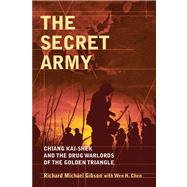The Secret Army Chiang Kai-shek and the Drug Warlords of the Golden Triangle
, by Gibson, Richard Michael; Chen, Wen H.- ISBN: 9780470830185 | 0470830182
- Cover: Paperback
- Copyright: 10/18/2011
Driven from Yunnan at the close of China#x19;s civil war, Chiang Kai-shek#x19;s Nationalist Chinese armies forcibly occupied much of northeastern Burma in early 1950.#xA0; With support from the American CIA and Thailand#x19;s military government, General Li Mi led those armies into Yunnan the next year.#xA0; They were pushed back into Burma.#xA0; Thereafter, Li Mi built a major base and settled in Burma#x19;s Shan State.#xA0; His meddling in Burma#x19;s ethnic insurgencies destabilized that new nation.#xA0; Moreover, recruiting unsavory armed border groups, Li Mi#x19;s army, known as the Kuomintang, or KMT, soon dominated the Golden Triangle opium trade.#xA0; Only when pressured by Washington and the United Nations did Taipei remove several thousand of its troops in 1953-54.#xA0; Several thousand chose to remain. In the late 1950s, amidst popular discontent on the Mainland, reinforcements from Taiwan prepared its army in Burma for another invasion of Yunnan.#xA0; That plan was derailed in late 1960 when, at Rangoon#x19;s invitation, the PLA entered Burma and drove the KMT into Thailand and Laos.#xA0; An international outcry over Taiwan#x19;s no-longer-secret army and intense US pressure forced Chiang to remove all but 3,000-4,000 troops.#xA0; Several hundred remained to fight as mercenaries for the Lao government but most that did not evacuate continued their drug trafficking from bases on the Thai-Burma border Separately, Taiwan#x19;s Intelligence Bureau of the Ministry of National Defense (IBMND) built a large intelligence-gathering and paramilitary force in Northeast Burma.#xA0; Allied with anti-Rangoon insurgent drug trafficking groups, the IBMND fought both the Burmese government and Burma#x19;s communist insurgents while launching ineffectual forays into Yunnan.#xA0; Mostly, however, it trafficked in drugs. Beginning in the 1970s, aging KMT units helped the Thai defeat communist guerrillas in North Thailand.#xA0; In return, most of the Nationalist Chinese remnants were given right of residence and, eventually, citizenship.#xA0; With international assistance, Thailand#x19;s new residents and their children prospered, largely weaning themselves from the narcotics trade in favor of agriculture and other lawful livelihoods.#xA0; Today#x19;s KMT villages in North Thailand are prosperous settlements with little of the drug trafficking for which their inhabitants were once notorious.






